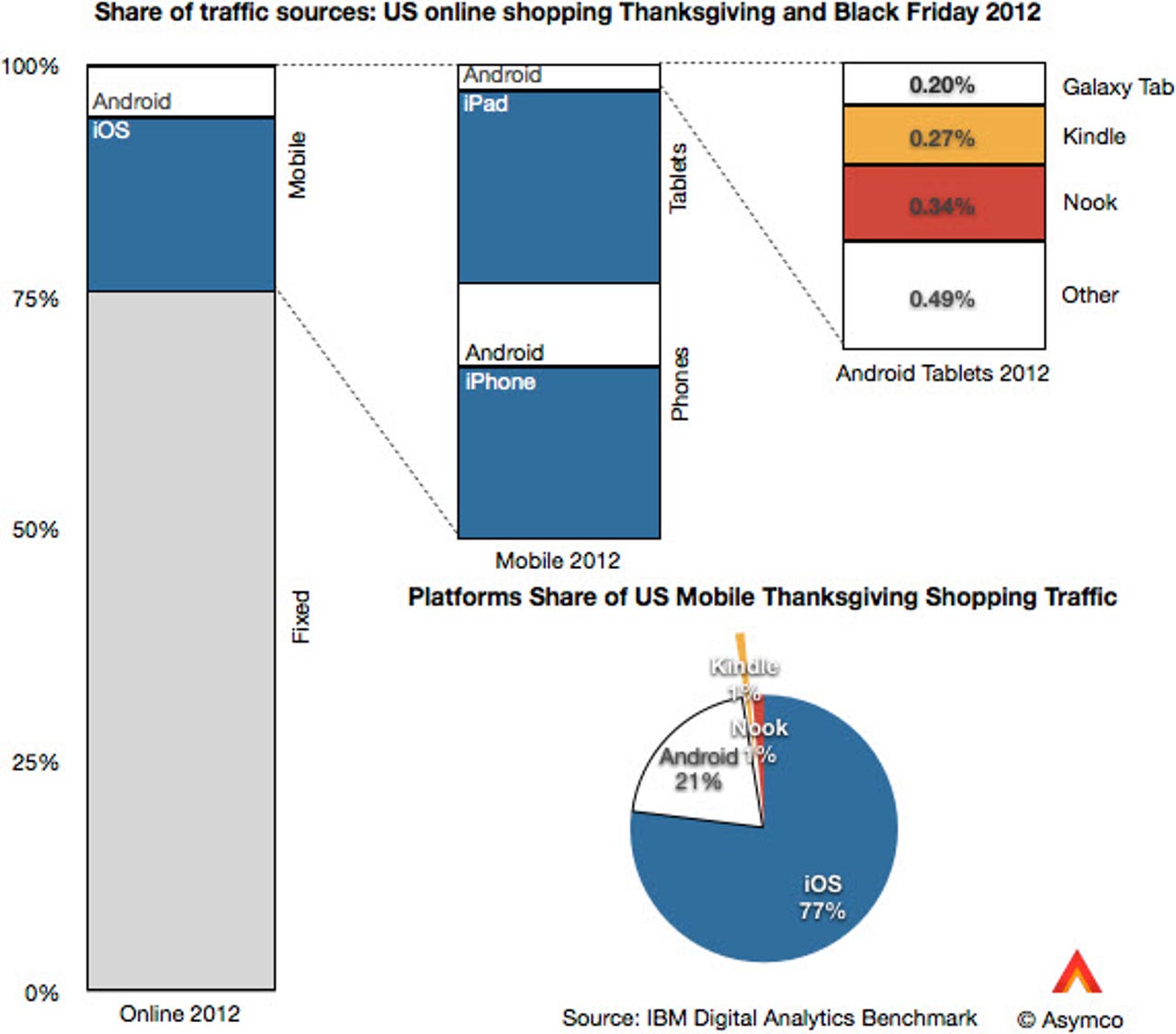Is Android too hard for the average user to figure out?

Yesterday, Asymco analyst Horace Dediu posted some charts based on data gathered by IBM’s Digital Analytics Benchmark for U.S. Thanksgiving and Black Friday sales.
However, there's one chart that stands out above the rest, and it's this one that shows the data broken down into individual platforms.

The part I am interested in specifically is the breakdown between Android and iOS devices, and it raises an interesting question.
It's clear that Android devices outsell iOS by a significant factor. According to IDC's Worldwide Mobile Phone Tracker, Google's mobile operating system accounts for 75 percent of the international smartphone market share.
In just three years, Android has crushed the smartphone competition.
If Android is dominant with respect to market share, why did Apple's iOS-powered devices wipe the floor with Android when it came to Thanksgiving and Black Friday online shopping?
It might be easy to try to pin this discrepancy down on the users themselves, perhaps by suggesting that iOS users are more flush and have more cash to spare, or that they are more conditioned to spend money on their smartphone or tablet because there are fewer free apps in the Apple App Store than in the Google Play store.
To be honest, I don't believe that the difference is down to the customer, and even Dediu dismisses this suggestion.
"I'm not satisfied with the explanation that Android users are demographically different," writes Dediu, "because the Android user pool is now so vast and because the most popular devices are not exactly cheap."
So if it's not the users, what is it? Dediu's not sure, but that doesn't stop him pointing fingers at where he thinks the problem lies.
"There is something else at play. It might be explained by design considerations or by user experience flaws or integration but something is different."
I think Dediu onto something here, but I think he's over-thinking the problem. I think it comes down to one rather simple but key difference between the two platforms.
iOS is easier to use than Android. Or, flipping that around, Android is too hard for the average user to figure out.
Let's face it, from the outside there's little to separate one black rectangle from another other than screen size. What separates them from each other is not how they look, but how they work, and if more people are buying Android devices than iOS devices, but more iOS users are using them to do real stuff like shopping, that's down to the software -- both the operating system itself, and maybe the apps.
But this data gives us an even deeper insight into the differences between Android and iOS usage. Online shopping is a task primarily carried out through the browser, and once you get as far as firing up the relevant browser on an Android or iOS device, the experience is, on the whole, not that dissimilar.
This would tend to suggest that the core difference between iOS and Android is that owners are more inclined to look at an iOS device -- whether it be an iPhone or an iPad -- as a tool to get things done. Android users aren't getting as far as clicking on the browser, because if they did, the experience from that point onwards is not that different to the iOS experience.
This would suggest that Google is facing a problem. People are buying Android-powered smartphones and tablets, but there are barriers or obstacles that gets in the way of engagement that aren't present in Apple's iOS platform.
Part of this is undoubtedly down to user education. Apple has spent a lot of time and money creating commercials that show its products being used to solve real-world problems. As short and as simple as these ads may be, they give owners -- and potential owners -- an idea of what the iPhone or iPad can do. That might seem extremely basic, but it gets people to explore the potential of their iDevice.
Compare this to ads I've seen for Android hardware, which seem to focus on the device itself rather that what it can do for the owner.
Monkey see, monkey do.
Image source: Asymco.